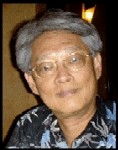Laboratories
Laboratory of Intelligent and Parallel Systems (LIPS) (Holmes 493)
Contact: D. Y. Y. Yun at http://ee.hawaii.edu/~dyun, email: dyun@hawaii.edu: phone: 956-7627
Objectives and Themes: LIPS has conducted advanced computational research, development and education at the University of Hawaii (UH) over the past 16 years, producing numerous system and technology achievements that are undergoing patents, copyrights, publication and other intellectual property pursuits, some of which are worthy of commercial explorations.Successful results and proven expertise reflect the common theme of achieving Virtual-X in computing:
(a)
From the BEAUTY (Greek's Icosahedron and today's soccer ball), rises the BEAST, a novel laser tumor detection system |
 A novel 3D-Fit algorithm and software achieves quality-guaranteed mesh generation and adaptive "Virtual Reality" for 3D object modeling, medical imaging and 3D television.
A novel 3D-Fit algorithm and software achieves quality-guaranteed mesh generation and adaptive "Virtual Reality" for 3D object modeling, medical imaging and 3D television.
(b) The super-computed "Virtual Experiments" of photon behavior in human tissueshave led to innovative and optimized designs of medical diagnostic systems prototyped to detect tumors (e.g., breast cancer) early using the less invasive near-infrared laser.
(c) The Ohana Health Online (OHO) remote monitoring system is a realization of the "Virtual Clinic" concept at the 6-year-old Website, www.the-ohanahealth.org, which provides continuous and persistent telehealth care and advices for chronic disease (particularly, diabetes) patients.
(d) Project MISSION is a pioneering and award-winning "Virtual Presence" system that integrates remote supercomputer simulation, 3D visualization, and bandwidth-on-demand communication for online computer-assisted radiation treatment planning, as detailed at www.proj-mission.org.
(e) LIPS continues to serve as the Electric and Hybrid Vehicle National Data Center (since 1994) via the www.ev.hawaii.edu Website. This model has been known as an operational, centralized "Virtual Laboratory" with hundreds of vehicles nationwide for data collection, performance analysis, simulation and report-generation-by-example access.
 Equipment and Facilities: Several research and technological innovations have been developed here over the past 15 years, including virtual experiments for the design of new breast-cancer detection devices, a remote monitoring system on the Web for diabetes that acts like a virtual case manager, visualization of 3D objects and fly-bys in virtual reality graphics, and bioinformatics software for human genomics and proteomics. A 240-processor supercomputer (with the aggregate power of 120GHz speed, 123GB memory and nearly 2 Terra-Bytes of disk storage), named LIPS240, puts the College of Engineering among a few elite universities with its own supercomputing environment for education, experimentation and application development. Thus, LIPS serves both the UH and the Hawaii communities with its significant expertise in computing technology R&D and in training skilled personnel, to assist the application development and commercialization rooted in Hawaii.
Equipment and Facilities: Several research and technological innovations have been developed here over the past 15 years, including virtual experiments for the design of new breast-cancer detection devices, a remote monitoring system on the Web for diabetes that acts like a virtual case manager, visualization of 3D objects and fly-bys in virtual reality graphics, and bioinformatics software for human genomics and proteomics. A 240-processor supercomputer (with the aggregate power of 120GHz speed, 123GB memory and nearly 2 Terra-Bytes of disk storage), named LIPS240, puts the College of Engineering among a few elite universities with its own supercomputing environment for education, experimentation and application development. Thus, LIPS serves both the UH and the Hawaii communities with its significant expertise in computing technology R&D and in training skilled personnel, to assist the application development and commercialization rooted in Hawaii.
